|
Every editorial report we write for our authors should achieve 7 goals. Some benefit us, some benefit our clients, but they’re all connected. If you feel your report-writing skills could do with a boost, use this goal-based framework to pep things up.
Let's look at the goals in brief; then we'll dig deeper.
Goals that benefit the editor
Goals that benefit the client
Efficiency means achieving the three goals that benefit the client without compromising on one iota of quality and without damaging our productivity. We are in business, after all.
Creating detailed editorial reports can eat into an editor’s hourly rate. It’s easy – even for experienced sentence-level editors – to omit the time for report-writing when creating a quote; I’ve done it myself. We focus on the number of words per hour we edit, based perhaps on a sample. Or perhaps we have included the report-writing component in our calculations but the author wants to negotiate on price. Every efficiency we incorporate allows us greater choice about whether to accept or reject a client’s proposal. Goal 2: Demonstrate editorial excellence
Our second goal is to demonstrate editorial excellence. Those of you who are members of a national editorial society might well be bound by a code of practice that demands this.
That’s the case for members of the Chartered Institute of Editing and Proofreading (CIEP), which says in its CoP: ‘Good communication between client/employer and freelance/employee is essential.’ Editorial excellence isn’t just about being an expert in typo hunting, grammar correction and stylistic revision. Neither does it end with clarity on the project brief or issues of privacy, confidentiality and security. It’s also about communicating the why of our edits. Comprehensive editorial reports are the perfect communication tool, and the reason why we shouldn’t skimp. Goal 3: Build trust
When we communicate the why of our decisions, we build trust.
If a client is anxious about how we’ve edited their work because they don’t understand the changes we’ve made and/or because we’re new to them, trust is low. Part of our job is to earn it. A comprehensive editorial report that demonstrates a deep knowledge of our craft creates author confidence. And that’s the key to a healthy business relationship. Goal 4: Compel future commissions and recommendations
A client with a detailed editorial report that demonstrates excellence and builds confidence in your ability is more likely to do the following:
Now let's look at the benefits for the author. Goal 5: Offer a comprehensive learning tool
Our fifth goal is to provide our authors with an outstanding learning tool, rich in problem/solution-focused detail, which they can use to hone their writing craft.
The independent-author market is huge, and many in the community lack experience – they’re right at the beginning of their writing journey. They might well have talent by the bucket load but the line work we do is nevertheless extensive. An editorial report gives us the chance to offer our guidance in a format that’s accessible and clear. And because it’s separate from their book file, they can refer to it time and again. A comprehensive learning tool includes strengths, too. Writers can learn as much from knowing what they’re doing well – and should continue doing – as from knowing how they can up their game. Goal 6: Take a mindful approach
Our penultimate goal is to show mindfulness. As editors, we can never forget that every one of our author clients has a choice – and they chose us. They also have a passion – their book.
It takes commitment to write a story, and sometimes not a little courage to place it in the hands of a professional editor, particularly one they haven't worked with before. That decision comes with risk. For the editor, being selected is a privilege rather than an entitlement. We must respect that choice, the risk taken, and their investment (time and money). Yes, we should report on weaknesses; that’s how they’ll improve their sentence-level craft. But we must do so gently and respectfully, and complement that analysis with reflection on their strengths. Goal 7: Provide a solution-based critical review
Many indie-author book files end up in our editing studios without having been evaluated by a developmental editor, a critiquing editor, an experienced beta reader or even a colleague or friend in a writing group.
Our reports need to offer a critical review that explores the book’s sentence-level strengths and weaknesses. What’s essential is that we offer solutions to any weaknesses we identify. Without those, we risk creating a shopping list of what was good and what wasn’t. That kind of analysis won’t help the author grow as a writer. Neither will it reflect our editorial excellence. Want to learn how to do it, and love it? If you’re a sentence-level editor and think your reporting skills could do with a boost, or a new editor who wants to nail it from the start, take a look at my new course, How to Write the Perfect Fiction Editorial Report.
Louise Harnby is a line editor, copyeditor and proofreader who specializes in working with crime, mystery, suspense and thriller writers.
She is an Advanced Professional Member of the Chartered Institute of Editing and Proofreading (CIEP), a member of ACES, a Partner Member of The Alliance of Independent Authors (ALLi), and co-hosts The Editing Podcast. Visit her business website at Louise Harnby | Fiction Editor & Proofreader, say hello on Twitter at @LouiseHarnby, connect via Facebook and LinkedIn, and check out her books and courses.
2 Comments
23/3/2020 08:49:12 am
So timely given I have just produced my first fiction critique. Thank you. The last point was a really interesting one for me. I produced a spreadsheet tool which had some basics per chapter (word and page count, setting, point(s) of view, primary, secondary and background characters, a one or two word summary, and plot/characterisation issues/problems). My author loved it and said he had found it so useful, but I'd only produced it to help myself write the report. Sent it to him almost as an afterthought!
Reply
Louise Harnby
23/3/2020 09:00:40 am
It's so worthwhile, isn't it, Howard? Really helps us put the client first.
Reply
Leave a Reply. |
BLOG ALERTSIf you'd like me to email you when a new blog post is available, sign up for blog alerts!
TESTIMONIALSDare Rogers'Louise uses her expertise to hone a story until it's razor sharp, while still allowing the author’s voice to remain dominant.'Jeff Carson'I wholeheartedly recommend her services ... Just don’t hire her when I need her.'J B Turner'Sincere thanks for a beautiful and elegant piece of work. First class.'Ayshe Gemedzhy'What makes her stand out and shine is her ability to immerse herself in your story.'Salt Publishing'A million thanks – your mark-up is perfect, as always.'CATEGORIES
All
ARCHIVES
July 2024
|
|
|
|


















 RSS Feed
RSS Feed





